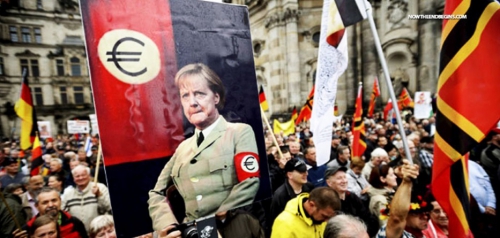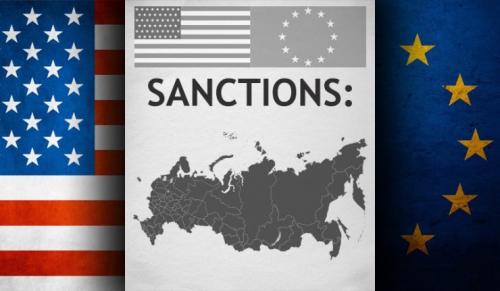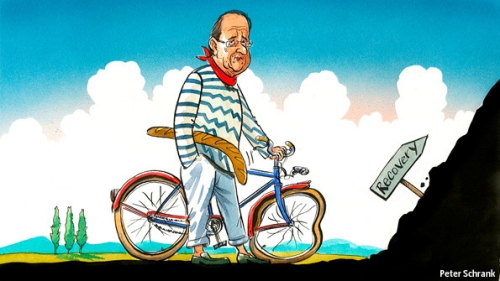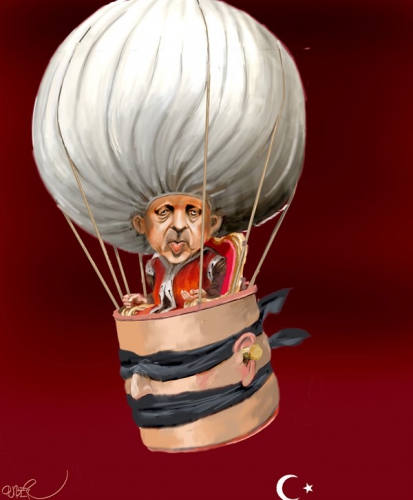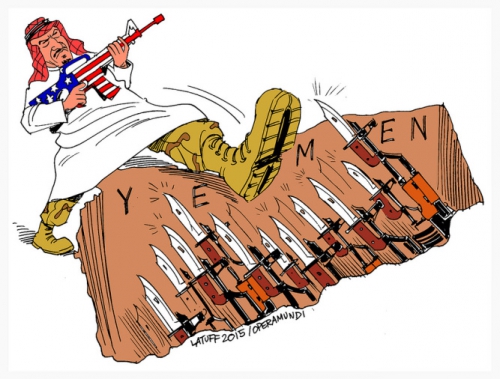AUßENPOLITISCHES
Rassismusvorwurf
Großbritannien diskutiert Einreiseverbot für Trump
Die Superwaffe des Mr. Glaser
Sanktionen gegen Russland und den Iran: Wie amerikanische Finanzbeamte zu Wirtschaftskriegern werden.
Nimr al-Nimr hingerichtet
Eskalation in Teheran: Demonstranten stürmen Saudi-Botschaft nach Massenexekution
Angeblich 4000 Ankünfte pro Tag
Griechischer Vizeminister schimpft: Türkei "bombardiert" uns mit Flüchtlingen
Intervention gefordert
FDP empört über dänische Grenzkontrollen
Pakistan schickt Flüchtlinge wieder in die EU zurück
Eskalation im Streit um die Flüchtlingspolitik zwischen der EU und Pakistan: Das Land weigert sich, aus der EU ausgewiesene Flüchtlinge zurückzunehmen - und schickt sie kurzerhand in die EU zurück.
Streit über Abschiebungen: Afghanistan will Flüchtlinge wieder aufnehmen
Die afghanische Regierung gibt offenbar dem Drängen der Bundesregierung nach: Kabul sichert jetzt doch zu, dass Deutschland Flüchtlinge zurückschicken kann.
(Narrenfreiheit)
Pariser Polizei-Angreifer
Attentäter hatte mehrere Identitäten
Syrer sprengt sich in die Luft
Istanbul: Neun Deutsche sterben bei Terroranschlag
Staatsbesuch in Italien
Wegen Irans Präsident: Kritik an Verhüllung von Nacktstatuen
Rüstung
Gabriel: Deal mit Saudi-Arabien wird fortgesetzt
Studie zu sozialer Ungleichheit
Reiche besitzen so viel wie halbe Welt
Kurz vorm Weltwirtschaftsforum in Davos schlägt Oxfam Alarm: Die wenigen Reichen würden immer reicher, die vielen Armen immer ärmer. Um die Kluft zu verringern, helfe nur eines: Steueroasen abschaffen und Vermögen stärker besteuern.
"Blackrock ist eine extrem gefährliche Firma"
(ebenfalls zu Blackrock)
Geld regiert die Welt - Die Story im Ersten
(Und hier beteiligt sich eine vermeintlich konservative Leitfigur an Blackrock…)
Ex-CDU-Spitzenpolitiker Merz soll Aufsichtsratschef von Blackrock werden
Roboter in der Wirtschaft Millionen Jobs fallen weg
Die Roboter erobern die Arbeitswelt. Jetzt macht eine düstere Prognose des Weltwirtschaftsforums in Davos die Runde: Die Automatisierung sei schuld.
Ohne ein Wunder stürzt Portugal uns in eine tiefe Krise
Portugal ist mit fast 130 Prozent seiner Wirtschaftskraft verschuldet. Und was macht die Linksregierung? Setzt auf noch mehr Schulden und will Reformen zurücknehmen. Das kann ernste Folgen haben.
Polen denkt nicht mehr an die Einführung des Euro
USA
Besetzung von Naturpark in Oregon endet blutig
Mexiko
Polizeientmachtung nach Mord an Bürgermeisterin
INNENPOLITISCHES / GESELLSCHAFT / VERGANGENHEITSPOLITIK
Innenpolitik 2016 - Christoph Hörstel im NuoViso Talk
Merkel in Neujahrsansprache: Deutsche sollen Deutschsein nicht allein für sich reklamieren
Kaum Interesse bei Zuschauern
Merkel sollte auf ihre Neujahrsansprache verzichten
Psychoanalytiker: "Merkel vollkommen irrational"
CDU in der Flüchtlingskrise: "Die Stimmung ist unterirdisch"
Zwischenruf während Rede
Hochschule prüft Konsequenzen für Merkel-Kritiker
Pressekonferenz: Verfassungsklage gegen Merkels Asylchaos
"Lageangepasst?", "Lageangemessen?"
Silvester-Nacht: Jetzt hat auch Innenminister de Maizière ein Wahrheits-Problem
Bundespräsident Joachim Gauck
Kurs auf den Ruhestand
Vorbild Hessen
Tauber ist offen für Schwarz-Grün im Bund
CDU-Generalsekretär Peter Tauber hegt eine gewisse Sympathie für Schwarz-Grün und kann sich eine Koalition im Bund ab Herbst 2017 vorstellen. Grünen-Chef Özdemir sieht währenddessen die Flüchtlingspolitik der CSU als hinderlich für eine Partnerschaft.
Sachsen-Anhalt
AfD-Aufschwung bedeutet Absturz des linken Lagers
Das Umfragehoch der AfD vor der Landtagswahl bereitet vor allem der SPD Kopfzerbrechen. Werden sie auf Rang vier verdammt? Die CDU warnt in der Flüchtlingskrise vor "Kontrollverlust an den Grenzen".
US-Experte George Friedman sagt Deutschlands Untergang voraus - aus diesen 3 Gründen
Mit dem Panzer gegen die Bürger?
Wolfgang Schäuble fordert Bundeswehreinsätze im Innern. Gegen wen aber werden die Kugeln fliegen? Werden die Streitkräfte zum Gehilfen eines rechtsbrechenden Regimes?
Richter Müller sieht Staatsversagen
"Wir brauchen härtere Urteile"
Finanzielle Repression
Deutschland beschränkt Handel mit Münzen, Briefmarken, Gemälden
(Beginnendes Bargeldverbot)
SPD fordert Abschaffung des 500-Euro-Scheins
SPD-Abgeordnete fordern die Abschaffung der 500-Euro-Banknote. Deren Existenz helfe Mafia und Terrororganisationen bei der Geldwäsche. Zudem solle es eine Obergrenze für Barzahlungen geben.
Kritik vom Städte- und Gemeindebund
Gesundheitskosten durch Asylbewerber belasten Kommunen
Im Wunderland
von Oliver Zimski
Täter auf freiem Fuß
Tausende Haftbefehle in Berlin nicht vollstreckt
Migrationskrise als föderales Verfassungsproblem
von Udo Di Fabio
Kommentar: AfD wird Publikumsliebling
Alternative für Deutschland
So günstig wie nie
von Karlheinz Weißmann
TV-Kritik: Sandra Maischberger
Wer kann Frau Petry noch den Wahlabend verderben?
Ralf Stegner will in der Sendung von Sandra Maischberger die AfD entzaubern. Das wäre gelungen, wenn es der SPD-Politiker mit Argumenten versucht hätte. Er bevorzugt allerdings plumpe Polemik.
LINKE / KAMPF GEGEN RECHTS /
ANTIFASCHISMUS / RECHTE
(Zu Heiko Maas)
Neues vom kleinen Agitator
von Michael Paulwitz
Rechte Szene vom Staat finanziert
NPD-Verbot soll das Wasser abgraben
(Statt Wahlkampfkostenerstattung für die NPD gibt man Steuergelder lieber für "antifaschistische" Demonstranten aus…)
Steuergelder
Brandenburg finanziert Demonstrationen gegen Rechts
(Mal sehen, ob noch Zeiten kommen, in denen die SPD vom Verfassungsschutz beobachtet wird…)
SPD will AfD vom Verfassungsschutz beobachten lassen
(Der nervös werdende SPD-Gabriel legt mit der VS-Keule nach…)
Gabriel für Beobachtung der AfD durch Verfassungsschutz
Für den Vizekanzler sind die Forderungen der AfD nicht mehr mit dem Grundgesetz vereinbar. Unterdessen erreicht die junge Partei bei einer Umfrage einen neuen Rekordwert.
(Identitäre im Visier von Verfassungsschutz und SPD...)
Hessen
Rechte Bewegung im Visier des Verfassungsschutzes
(Ein weiterer geistiger Brandstifter aus der SPD fordert offen Zensur)
Pistorius fordert zum Werbeboykott der Jungen Freiheit auf
Report Mainz
Öffentlich-rechtlicher Angriff auf die Pressefreiheit
von Dieter Stein
In eigener Sache
Kritik an „Report Mainz“ wächst
Staatsfunk SWR
Der sanfte Druck aus Mainz
Pressefreiheit
Unter Pharisäern
von Hans-Hermann Gockel
Fernsehdebatten
Gabriel lehnt TV-Auftritte mit AfD-Politikern ab
Lindenhorst: Wütende Bürger verscheuchen SPD-Infostand!
Brigadegeneral Günzel: Es reicht! Für wie dumm haltet ihr uns?
Großeinsatz am Kölner Bahnhofsvorplatz
200 Demonstranten am Hauptbahnhof festgesetzt
Die Polizei hat am Hauptbahnhof etwa 200 Demonstranten festgehalten. Die Gruppe aus Russen und Russland-Deutschen hatte sich einer Pro-Köln-Demonstration angeschlossen. Anschließend war ein Gang durch die Altstadt geplant.
"Oldschool Society": Generalbundesanwalt klagt mutmaßliche Neonazi-Terroristen an
Die politische Verrohung kommt von links
Hasskommentare im Internet auch gegen BFF
"Die Partei" – Was steckt hinter der Clownsmaske? (1. Teil)
Die olle Linke und die Knete
"Die Partei" – Was steckt hinter der Clownsmaske? (2. Teil)
Der immer gleiche GröFaZ-Witz
Studie des Verfassungsschutzes
Linksextremisten in Berlin immer gewalttätiger
Stuttgart
Linksextremisten bekennen sich zu Anschlag auf CDU-Zentrale
Burschenschafter in Göttingen verprügelt
Göttingen
Linksextremisten drohen mit Ermordung von AfD-Mitglied
Linksextremismus
Wohnhaus von AfD-Abgeordneter angegriffen
(Angriff auf den AfD-Politiker Thomas Traeder in Köln…)
Zunehmende Antifa-Gewalt
Ergebnis geistiger Brandstiftung durch Altparteien
Attacke in Karlsruhe
Vermummter schießt mit Pistole auf AfD-Plakataufsteller
Im Wahlkampf in Baden-Württemberg hat sich ein ernster Zwischenfall ereignet. Ein Helfer der AfD wurde in Karlsruhe angegriffen.
Kommentar zur Attacke auf AfD
Wer hat mitgeschossen?
von Michael Paulwitz
Rheinland-Pfalz
AfD-Veranstaltung: Linkspartei bedrängt Gastwirt
AfD in Mannheim
Gewaltbereite Antifaschisten gehen auf Frauen und Rentner los
Bespuckt, bedrängt und zu Boden gestoßen
Linke Gewalt
SPD-Büro von Linksextremisten angegriffen
Linke Antworten auf Köln: „Nie wieder Deutschland“
Linke Pressevertreter schmeissen bei Anti-Pegida-Aktion Böller – Video
(Im Gegensatz zur Silvesternacht zeigt sich die Polizei gegen deutsche Bürger stets wehrhaft…)
Nach Ausschreitungen: Polizei löst Pegida-Demo in Köln auf
Pegida-Demo in München geht in Pfeifkonzert unter
Demonstration in Dresden
Brandanschlag auf Pegida-Anhänger
Ableger in vielen Ländern
„In Prag sind wir Volkshelden“: Wie sich Pegida in ganz Europa ausbreitet
Sachsen-Anhalt: Angreifer schlagen rechte Demonstranten krankenhausreif
Zwei Dutzend Männer haben in Oschersleben in Sachsen-Anhalt mit Eisenstangen und Baseballschlägern auf Teilnehmer einer rechtsextremen Demo eingeprügelt. Die Polizei vermutet Linksautonome hinter der Attacke.
Zweifel an Angriff
Hat Linken-Politiker Messerattacke erfunden?
EZB-Demo Blockupy-Schaden beziffert
Der Sachschaden bei der gewalttätigen Blockupy-Demo in Frankfurt summiert sich auf etwa 1,4 Millionen Euro.
Blockupy
9 Monate nach linker Gewaltorgie: Magistrat will wenig wissen
Dokumentation einer großen BFF-Anfrage zum 18. März 2015
RAF-Terroristen offenbar wieder aktiv
Sie haben "Erfahrung und kriminelles Know-How"
Raubüberfälle durch RAF-Terroristen – Experte: „Es war nur eine Frage der Zeit“
EINWANDERUNG / MULTIKULTURELLE GESELLSCHAFT
Düstere Flüchtlings-Prognose
Historiker sagt voraus: "Das Deutschland, wie wir es kennen, wird verschwinden"
965.000 Flüchtlinge haben bis Ende November offiziell ihren Weg nach Deutschland gefunden. Spielt das eine Rolle in der Frage, wie wir leben, wer wir sind? Ein deutscher Historiker meint: Auf alle Fälle - und sagt, was jetzt getan werden muss.
Entwicklungsminister Müller
„Erst zehn Prozent der Fluchtwelle ist bei uns“
Der Höhepunkt der Flüchtlingskrise steht Deutschland laut Entwicklungsminister Müller noch bevor. Acht bis zehn Millionen Menschen seien unterwegs. Nur Abschottung helfe nicht.
Migrantenkrise
Die Lawine kommt ins Rollen
Ein Alarmsignal: In der Ägäis hat sich im Januar die Zahl der Migranten gegenüber dem Januar 2015 verzwanzigfacht. Ein Jahr lang haben potentielle Migranten von Afrika bis Asien zugeschaut, wie einfach der Weg über die Balkanroute ist. Jetzt machen sie sich auf den Weg. Die Europäer haben nur noch wenige Winterwochen, um die EU-Außengrenzen abzuriegeln. Sonst droht Dramatisches.
Sturm der Nordafrikaner nach Deutschland. Als syrische Flüchtlinge getarnt
Sloterdijk rechnet mit Merkel ab: "Es gibt keine moralische Pflicht zur Selbstzerstörung"
Hardcore-Globalist Ulf Poschardt ("Die Welt") contra Sloterdijk:
Peter Sloterdijk und die Grenzen der Liberalität
In der Flüchtlingsfrage stimmt nun auch Philosoph Peter Sloterdijk in den Chor der Apokalyptiker ein. Warum singen radikal liberale Denker wie er plötzlich Loblieder auf Grenzen? Eine Widerrede.
"Merkel ist eine Visionärin der offenen Grenzen"
Die Internationale Organisation für Migration preist Merkels Kurs und kritisiert mangelnde Solidarität mit Deutschland. Generaldirektor Swing sagt: "Wir müssen mit Unterschiedlichkeit umgehen lernen."
Razzien
Alles auf den Prüfstand
Razzien in Asylbewerberheimen wie in Recklinghausen zeigen, wie chaotisch die Registrierung von Flüchtlingen verläuft. Betrüger, die mehrfach Leistungen kassieren wollen, haben leichtes Spiel.
EU gesteht: 60 Prozent der Einwanderer sind keine Flüchtlinge
Die EU räumt ein, dass die öffentliche Darstellung, die Mehrzahl der nach Europa strömenden Migranten seien Flüchtlinge, falsch war: Ein Frontex-Bericht belegt, dass 60 Prozent der Einreisenden keinen Anspruch auf Asyl haben. Sind sie erst einmal in der EU, ist eine Abschiebung kaum möglich. Angela Merkel lehnt eine Schließung der Grenzen und ordnungsgemäße Pass-Kontrollen nach wie vor ab.
Asylkrise
CDU-Abgeordneter: Masseneinwanderung ist alternativlos
Schwesig gegen Einschränkungen beim Familiennachzug
Die Familienministerin fordert die Union auf, Familienangehörigen aus sicheren Drittstaaten den Nachzug nicht zu verwehren. Gerade Kinder erleichterten die Integration.
(Zu Plasberg…)
TV-Kritik
Keine Spur von Nachdenken
von Albrecht Klötzner
Merkels Flüchtlingspolitik ist Größenwahn
Politisches Handeln führt oft zum Gegenteil dessen, was beabsichtigt war. Die Geschichte ist voll mit Beispielen gescheiterter Weltverbesserungsversuche. Das gilt auch für den Kampf gegen den Terror.
(Ein Beispiel für den Machbarkeitswahn der Einwanderungsbefürworter)
Flüchtlingshilfe : Keine Angst, wir machen das!
Weder Obergrenze noch Abschiebung werden uns helfen, die Zukunft zu gestalten. Das geht nur mit dem Willen, gut zusammenzuleben. Dafür steht die Bewegung Wir machen das.
Frauen verteilen in Berlin Rosen an Flüchtlinge
Holocaust-Überlebende im Bundestag
"Sie haben den Beifall der Welt gewonnen"
Die amerikanische Schriftstellerin Ruth Klüger überlebte als Kind das Konzentrationslager. Zum Holocaust-Gedenktag hat die 84-Jährige in einer eindrücklichen Rede im Bundestag ihr Leiden geschildert - und Deutschland sowie Merkels Flüchtlingspolitik gelobt.
Brüssel will Staaten auflösen
Klaus warnt vor "Migrations-Tsunami"
Es klingt wie eine absonderliche Verschwörungstheorie: Die Flüchtlingsbewegung sei von der EU gesteuert und solle zum Ende der Nationalstaaten führen. Das erinnere an Stalin und Hitler. Allerdings stammen die Aussagen von einem früheren Präsidenten.
Österreichischer Außenminister
Sebastian Kurz: "Einladungspolitik war absolut falsch"
"Länger reichen die Kräfte nicht"
Grenzkontrollen überfordern Bundespolizei
Die Flüchtlingskrise stellt Deutschland vor enorme Herausforderungen: Aus der Sicht der Polizeigewerkschaft können die Beamten an der deutsch-österreichischen Grenze nicht mehr lange durchhalten.
Dicke Luft in Kreuth
Merkel kontrolliert die Obergrenze
"Wir schaffen das nicht!"
Landrat Dreier schickt Bus voller Flüchtlinge zu Angela Merkel
Finanzierung der Flüchtlingskrise
Schäuble schlägt Benzin-Sonderabgabe vor
Wer bezahlt die Flüchtlingskrise? Finanzminister Schäuble schlägt nun vor, einen Aufschlag pro Liter Benzin zu erheben. In einem Interview verrät er noch eine weitere Forderung.
Ein Ort, der verbindet
Hafen 2 bringt Flüchtlinge und Einheimische zusammen
Die Turnhallen-Not wird zum teuren Dauerzustand
In rund 1000 Turnhallen sind Flüchtlinge untergebracht. Schulen und Vereinen wurde gesagt, dies sei vorübergehend. Nun zeigt sich: Es ist kein Ende in Sicht. Und wo doch, drohen hohe Sanierungskosten.
Frustrierende Verfahren
Woran in der Praxis Abschiebungen oft scheitern
Ostdeutsche Kleinstädte
Zwischen Verfall und Vision
In Zeitz und Naumburg stehen Häuser, die niemand geschenkt haben will. Die ostdeutschen Städte stemmen sich gegen Alterung und Leerstand. Sind die Flüchtlinge ihre Rettung?
Die mit Geld und Diplom gehen in die USA
Wie Syrer über syrische Flüchtlinge denken - Die Landjugend und das Abenteuer Europa
Özoguz: Schulbücher sollen Einwanderung positiver darstellen
Österreich
Liedtext: Lehrerin ersetzt Gott durch Allah
"Wir verteidigen Europas Werte"
Ingenieure auf Realschulniveau
Ärzte geben Entwarnung
Flüchtlinge sind "übernormal gesund"
Meinung
Flüchtlinge fahrlässig lässig fahren lassen
von Thomas Paulwitz
Flüchtlingshelferin packt aus
"Ich halte es dort nicht mehr aus"
Behörden überlastet
Geld für Asylbewerber: Berliner Senat gesteht Rechtsbruch
Flüchtlinge in Baden-Württemberg
Zahnersatz könnte Milliarden kosten
Zeugen bekommen angeblich einen Maulkorb
Leser beklagt "katastrophales Benehmen" von Tegernseer Flüchtlingen
Neues Quartier am Ortsrand
Deizisau nimmt aggressive Flüchtlinge auf
Attacke auf Polizeistation
Angreifer von Paris lebte in deutscher Asylbewerberunterkunft
Ralf Stegner
SPD gegen leichtere Abschiebungen von Kriminellen
SPD-Ortsvereine demonstrieren gegen Flüchtlingsheime
Lokalpolitiker der SPD lösen in Nordrhein-Westfalen mit einem Aufruf zu einer Demonstration gegen Flüchtlingsunterkünfte Empörung aus. Die Wortwahl erinnert dabei an Gruppen wie Pegida.
(Auch die SPD-Rebellen wurden umgehend zurückgepfiffen)
"Kollektiver Selbstmord": So hart rechnet die Schriftstellerin Monika Maron mit der Flüchtlingspolitik ab
Deutsche Asylpolitik wird platzen wie "Eitergeschwür"
Die osteuropäische Presse nutzt die Übergriffe in Köln für die ohnehin aufgeheizte Flüchtlingsdebatte. Ein weiteres Verdrängen deutscher Migrationsprobleme werde das Land und Europa "erschüttern".
Video
Der fehlende Part: Das Geschäft mit den Flüchtlingen
Lage 2016 (1): der Verlust des öffentlichen Raumes am Beispiel Zwickau
Lage 2016 (2): Hygienefimmel und Thymos-Regulierung
Lage 2016 (3): Verfassungsbeschwerde der Bürgerinitiative „Ein Prozent“
Rund um den Kölner Hauptbahnhof
Gruppe von 40 bis 50 Personen verhöhnte und belästigte Frauen an Kölner Bahnhof
("Opfer und Zeugen sprachen der Polizei gegenüber von Männern nordafrikanischen Aussehens.")
Sexuelle Belästigungen in der Silvesternacht
Polizei Köln geht von 40 verschiedenen Tätern aus
(Polizeibericht: "nach Zeugenaussagen nordafrikanisch Aussehenden…")
Sexuell bedrängte Frau in Köln: "Die waren mit ihren Händen wirklich überall"
(Zitat: "Sie alle sollen kopierte Papiere dabei gehabt haben, Aufenthaltsbescheinigungen für Asylverfahren.")
Eskalation am Kölner Hauptbahnhof
Polizist berichtet: "Was die Frauen dort erlebt haben, waren Vergewaltigungen"
(ähnliches in Stuttgart…)
Stuttgart-Mitte
15 Männer rauben zwei Frauen aus
In der Silvesternacht sind zwei junge Frauen in Stuttgart von einer Gruppe Männer erst bedrängt und dann ausgeraubt worden. Die Polizei sucht Zeugen.
(Zitat: "Die Täter sind schwarzhaarige Südländer mit arabischem Aussehen.")
(ähnliches in Hamburg…)
Wie in Köln: Sexuelle Übergriffe auf junge Frauen in Hamburg
(…und in Bielefeld)
Sexuelle Übergriffe in der Silvesternacht auch am Bielefelder Boulevard
Bielefeld Boulevard: Erschreckender Bericht eines Türstehers zu den Silvestervorgängen
Zwickau
Nach Silvesterattaken
Bar führt Ausweispflicht für Ausländer ein
(…und in Berlin)
Vereinzelte sexuelle Übergriffe auch in Berlin
Finnland: Polizei meldet Übergriffe auf Frauen an Silvester
Sexuelle Übergriffe
Gruppenvergewaltigung in Weil am Rhein – Vier Syrer in Haft
So erlebten Zeugen die Sex-Attacken an Silvester in Nürnberg
Frankfurt
Frauen belästigt und bestohlen
Tatort Eiserner Steg
Relativierung der Silvester-Ereignisse scheitert im Römer
Zwei BFF-Reden gegen die geistige Unterwerfung des Parteienblocks
In diesen Städten kam es zu Sex-Attacken
Sex-Attacken: Schon zehn Anzeigen in Österreich
Polizei-Führer berichtet
Meine Nacht mit dem brutalen Mob
Interner Polizeibericht zu Kölner Silvesternacht: "Es waren einfach zu viele zur gleichen Zeit"
Polizeiführer packt aus
Sex-Attacken in Köln: „Frau Merkel hat mich eingeladen“
Beamte packen aus
Polizisten berichten: Asyl-Kriminalität wird systematisch vertuscht
Polizei in der Asylkrise
"Die lachen uns doch nur noch aus"
Beamter bestätigt Kölner "Maulkorb"
"Anzahl der Straftaten war Innenministerium bekannt"
Nach Massenbelästigungen
Kriminalbeamte fordern Nennung von Straftäter-Nationalität
Bei Straftaten in Deutschland
Vorgaben von oben? Bundespolizist: „Wir dürfen Flüchtlinge nicht mal festhalten“
Werden Flüchtlinge bei einer Straftat anders behandelt als Deutsche? Ein ungeheurer Verdacht, dem ein Bundespolizist neue Nahrung gibt. Er behauptet, dass er zu einem speziellen Verhalten angehalten ist.
Silvesternacht in Köln: Ermittler orten gestohlene Handys in Flüchtlingsheimen
Nach sexuellen Übergriffen
Kölner Neujahrsnacht: Drei weitere Asylbewerber festgenommen
Nach sexuellen Übergriffen
Dortmund: Polizei verzeichnet Ansturm auf kleinen Waffenschein
Vorfall am Kölner Hauptbahnhof
24-Jährige berichtet von erneutem Fall von sexueller Belästigung
Oberbürgermeisterin legt Frauen "Verhaltensregeln" nahe
Nach der sexuellen Gewalt an Silvester arbeitet Köln daran, im Karneval ähnliche Übergriffe zu verhindern. Dazu gehören "Verhaltensregeln" für Frauen, etwa "eine Armlänge" Abstand zu Fremden.
"Wenn sie halbnackt herumlaufen, passiert sowas"
Äußerungen des Kölner Imams Abu-Yusuf, Frauen hätten die Übergriffe der Kölner Silvesternacht durch ihre Kleidung provoziert, sorgen für Empörung. Doch der Imam fühlt sich falsch verstanden.
(Zum Rücktritt des Kölner Polizeipräsidenten)
Bauernopfer
von Henning Hoffgaard
Das Fanal von Köln: Ethnokultureller Konflikt und sexuelle Gewalt
Birgit Kelle
Schreckliche Taten in Köln
Sexuelle Gewalt gegen Frauen: Warum der Aufschrei gegen die Täter nicht ausbleiben darf
JF-TV: "Die Schande von Köln"
Der Ausnahmezustand und die Grenzen der Moral
Ex-Minister Friedrich spricht von "Schweigekartell"
Nach den Übergriffen in Köln macht Hans-Peter Friedrich den Öffentlich-Rechtlichen schwere Vorwürfe. Der CSU-Politiker vermutet "Nachrichtensperren", sobald es um Vorwürfe gegen Ausländer gehe.
Öffentlichkeit wurde nicht gewarnt
NRW-Politiker wussten schon 2014 von kriminellen Nordafrikaner-Banden
Nordafrikanische Antänzer in Dortmund
Antidiskriminierungsstelle drängte Polizei zur Zensur
Sexuelle Übergriffe
Erste Touristen sagen Reise nach Köln ab
Wegen der Attacken auf Frauen in der Silvesternacht haben Urlauber geplante Fahrten nach Köln storniert. Gastronomen und der Messechef bangen um den Ruf der Domstadt.
Nach Übergriffen in Köln
Erste Stadt in NRW sagt Karnevalsumzug ab
Broschüre auf arabisch
Kölner Karneval lädt Asylbewerber ein
Frankfurter Fastnachtsumzug
Absage aus Angst vor Terror
Die Frankfurter Frauengarde nimmt nicht am Fastnachtszug teil. Die Absage begründet der Karnevalsverein mit der derzeitigen Lage in Deutschland.
(Nach Köln)
Drei Männer festgenommen
60 Polizisten durchsuchten Flüchtlingsheim in Brück
(Zusammenhang zu den Kölner Taten?)
Homosexuelle in Freiburg auf der Straße angegriffen
(Nordafrikaner gegen Transsexuelle in Dortmund)
(Versuchte) Steinigung in Deutschland
Dortmund: Nordafrikaner wollten angeblich Transsexuelle steinigen
Meinung
Das häßliche Gesicht der Landnahme
von Michael Paulwitz
Köln und die deutschen Männer
Beuterepublik Deutschland
Die Kölner Silvesternacht und das Ende der Autosuggestionen
Muslime, Migranten und Vergewaltigungen: ein Blick auf die Hintergründe
Frauenbild in der arabischen Welt
Ein soziales Krebsgeschwür
Die Silvester-Ereignisse und Frankfurt
Eine Positionsbestimmung aus aktuellem Anlass
Relativierung der Silvester-Ereignisse scheitert im Römer
Zwei BFF-Reden gegen die geistige Unterwerfung des Parteienblocks
(Ein linker Einwanderungsbefürworter sieht keinen Unterschied zum deutschen Umgang mit Frauen. Die Einwanderer hätten sich vielmehr in die einheimische Kultur und deren Umgang mit Frauen integriert…)
Köln, die Medien & die Heuchelei
MuslimStern brüskiert Opfer an Silvester: „Tatverdächtige seien Beispiele für gelungene Integration“ – „Keusche Kleidung“
Dirk Müller: Polizei-, Medien- und Politikversagen
Der Ausnahmezustand und die Grenzen der Moral
(Die SPD-Logik)
Nach Übergriffen in Köln
NRW-Innenminister: Aussagen in Chats sind so widerlich wie die Taten selbst
(Claudia Roth-Logik)
"Mob ruft zur Jagd auf nicht weiße Menschen auf"
"Als würde sexualisierte Gewalt nur von außen ins Land getragen": Claudia Roth betont nach den Köln-Exzessen, dass Angriffe auf Frauen häufig sind. Rechte Hetzer seien "geistige Brüder" der Täter.
(Die Jakob Augstein-Logik)
Empörung auf Twitter176
Jakob Augstein verharmlost Kölner Sex-Attacken
(Die UN-Logik)
UN-Migrationsbeauftragter nach Köln: Flüchtlinge verdienen Respekt
Die Stunde der Verharmloser
Politische Tektonik, gesellschaftliche Drift
(Auflistung)
Sexuelle Übergriffe
Bedrängt, belästigt, vergewaltigt
(Zum Thema Vorverurteilung. Nach Schüssen auf ein Asylbewerberheim in Dreieich ist zwar noch kein Täter und kein Motiv ausgemacht, aber die weitenteils linksradikalen Demonstranten "gegen Rassismus" "wissen" ohnehin bereits, woher der Wind zu wehen hat…)
Nach Schüssen auf Flüchtlingsunterkunft
Bilder: Demonstration gegen gegen Rassismus
Nach Schüssen auf Flüchtlingsunterkunft in Dreieich
Bildergalerie: Mahnwache in Neu-Isenburg
Versuchter Raub – Offenbach
Bornheim
Nach sexuellen Belästigungen
Stadt erteilt Asylsuchenden Schwimmbadverbot
Zwickau
Asylanten nutzen Schwimmbecken als Klo und belästigen Frauen
Münchner Schwimmbäder
Mit Comics und Baderegeln auf Arabisch gegen sexuelle Belästigung
Ausländerkriminalität
Düsseldorf zählt Hunderte verdächtige Nordafrikaner
Polizei über kriminelle Nordafrikaner in Düsseldorf
Diebesbande "wächst und wächst"
(9.1.)
Oldenburg: Mehrere Frauen sexuell belästigt
Limburg
Shisha-Zange in Rücken gestochen
Attacke in Flüchtlingsheim folgte Streit um Musikanlage
Erding: Randale und Belästigung durch Asylbewerber
Fehmarn: Flüchtlinge überfallen Juden
Bayern
Wohnungen gefordert: Asylbewerberinnen verprügeln Helfer
Terror-Verdacht gegen Flüchtlinge
Terror-Ermittlungen gegen zehn Flüchtlinge in Hessen
Die Staatsanwaltschaft Frankfurt ermittelt gegen zehn Asylbewerber aus hessischen Flüchtlingsunterkünften. Der Verdacht: Vorbereitung einer schweren staatsgefährdenden Straftat.
Muslimische Security verprügelt Christen im Asylheim
Christliche Flüchtlinge sind in Heimen Schikanen und Gewalt durch Islamisten ausgesetzt. Einige türkisch- und arabischstämmige Sicherheitsleute schauen nicht nur weg – sondern schlagen selbst zu.
Angeblicher sexueller Übergriff beschäftigt
Mädchen von Flüchtling belästigt? Staatsanwalt ermittelt
Sexattacke bei Kinderbecken in Linzer Hallenbad
Raubüberfall in Frankfurt
Mit Pistole im Café: Polizei fahndet mit diesem Foto nach Verdächtigem
Duo beraubt Passanten
Überfall: Polizei sucht diese Männer
Vier Jahre für Messerangriff auf Ex-Frau
Flucht rettet vor längerer Haft
(Afghanen)
Auftakt im Mordprozess
Drei Angeklagte nach tödlichem Raub und Brand vor Gericht
(Südländisches Aussehen)
Schlüchtern
Überfall in Schlüchtern: Trio verletzt Frau schwer
NRW
Nordafrika-Banden auf Raubtour in Zügen
Flüchtlingserlass Kiel
Ladendiebstahl ohne Strafe
Die Führung der Polizeidirektion Kiel und hochrangige Vertreter der Staatsanwaltschaft haben sich Anfang Oktober 2015 darauf verständigt, Flüchtlinge ohne Ausweispapiere oder behördliche Registrierung bei „einfachen/niedrigschwelligen Delikten“ wie Ladendiebstahl und Sachbeschädigung regelmäßig nicht strafrechtlich zu verfolgen.
Keine Handhabe gegen 18-Jährigen
Hausverbot schreckt nicht ab: Täter kehrt an Tatort in Bad Hersfeld zurück
Villingen-Schwenningen
Entsetzte Reaktionen nach Handgranatenfund auf Asylgelände
(Den traumatisierten Refugees werden nun Waffen in die Hand gegeben…)
Schweden: Snipertraining für Flüchtlinge
Der schwedische Staat finanziert für neu angekommene "Flüchtlinge" eine Scharfschützenausbildung, als Teil des Integrationsprogramms und trotz der ständig zunehmenden von Flüchtlingen begangenen Terroranschläge in Europa.
Schweden: Flüchtling ersticht 22-jährige Helferin
KULTUR / UMWELT / ZEITGEIST / SONSTIGES
„Die moderne Rekonstruktion“
Ein wichtiges neues Buch für die Freunde schöner Architektur
Wie Bürger für die Schönheit ihrer Städte kämpfen
Berlin, Potsdam, Dresden, Frankfurt am Main: In Deutschland werden so viele historische Gebäude rekonstruiert wie lange nicht mehr. Die Vorherrschaft einer verordneten, kargen Moderne ist vorbei.
Stiftung will Gutshäuser in Brandenburg retten
Reutte
Denkmalschutz der Südtiroler Siedlung entzweit die Reuttener
BM Alois Oberer geht rechtlich gegen die Unterschutzstellung vor, Bauausschussobmann Ernst Hornstein wünscht sich die Erhaltung.
Gender
Berliner CDU kritisiert Umbenennung von Studentenwerk
Andreas Lombard: „Homosexualität gibt es nicht“ – eine Rezension
Indien
Per Taxi gegen die Diskriminierung von Transsexuellen
Die meisten Hindus sprechen Transsexuellen zwar besondere Kräfte zu, schließen sie aber vom öffentlichen Leben aus. Eine Taxifirma in Mumbai bietet ihnen nun einen Weg zurück in die Gesellschaft.
Spielzeugfigur mit neuen Maßen : Barbie-Puppe gibt es endlich auch in groß, klein und „kurvig"
Seit Jahrzehnten das liebste Spielzeug vieler Mädchen: die Barbie-Puppe. Nach Kontroversen um ihr Aussehen und zurückgehenden Verkaufszahlen stellt Mattel jetzt Puppen mit neuen Maßen vor.
Nach sexuellen Übergriffen in Köln: Wie das Medienversagen den sozialen Frieden gefährdet
Sex-Angriffe: Wollten Medien Köln, Hamburg vertuschen?
Öffentlich-rechtliche Regie
Wer zur Gewalt in Köln nicht gefragt ist
Experten dürfen im Interview nicht von Flüchtlingen sprechen, Moderatoren tun Polizeiaussagen als „wahrscheinlich letztlich Klischees“ ab: Wie der Rundfunk mit der Silvesternacht von Köln umgeht, ist das Gegenteil von Journalismus. Ein Kommentar.
Sexuelle Übergriffe
Auch Schweden vertuschte Ausländergewalt
Kommentar
Über die Lügen in „Bild“
von Michael Paulwitz
Angebliche Anweisung
WDR-Reporterin zur Asylkrise: Wir sollen positiv berichten
Umstrittene Äußerungen zu WDR-Berichterstattung: "Totalen Quatsch verzapft"
WDR-Journalistin
„Fast alle Journalisten haben sich einen Maulkorb auferlegt“
(AfD-Ausgrenzung im Fernsehen)
Meinung
Staatsfunker in Panik
von Michael Paulwitz
Medien
AfD erhebt schwere Vorwürfe gegen „Welt“-Journalist
Magdeburg : Journalisten bei AfD-Demo angegriffen
Ein MDR-Team und ein ZDF-Kameramann sind in Magdeburg mit Pfefferspray attackiert worden. Zwei Journalisten stellten Strafanzeige.
(Dazu ein Kommentar…)
Hetze zeigt Wirkung
Kommentar: Angriff auf Presse bei AfD-Kundgebung
taz
"Staatsknete"
"Der Kaufpreis ist deutlich zu gering"
von Ronald Gläser
Berlin sponsert linkes Blatt
von Dieter Stein
IVW-Zahlen
„Bild“, „FAZ“ und Co. verzeichnen dramatische Auflageverluste
"Ergebnisoffene Prüfung"
Presserat debattiert Nennung von Täterherkunft
Kommentar zum "Unwort des Jahres"
Manipulation des Jahres
von Michael Paulwitz
(Zur Methodik der "Lügenpresse")
Schwarze Haare, dunkle Augen, breitbeiniger Gang, Bock auf Streß – Köln ist überall
(Zur Methodik Bundeszentrale für politische Verbildung…)
„Fluter“
Bundeszentrale würdigt Mohammed als Frauenrechtler
Vitalik Buterin - "digitaler Lenin"
Der Mann, der heimlich unser Finanzwesen revolutioniert
Eine neue Technologie elektrisiert die Finanzwelt: Blockchain. Vitalik Buterin ist einer der führenden Köpfe dahinter. In der Schweiz bastelt der 21-jährige Russe an einer revolutionären Software - die den weltweiten Zahlungsverkehr für immer verändern dürfte.
Gesprengte Geldautomaten in NRW: Die einen machen Beute, die anderen nur viel kaputt
Halbwertzeiten der Lüge
Untergang des Römischen Reichs
Das Ende der alten Ordnung
Das Römische Reich war fremdenfreundlich. Doch Einwanderer ließen sich nur in überschaubarer Zahl integrieren. Das Machtgefüge verschob sich. Den Fremden blieb das Reich fremd – trotzdem übernahmen sie die Macht.
Götz Wiedenroth - Karikaturen
Nichts ist komischer als der Wahnsinn
Der wahrscheinlich beste Film des Jahres: Da war einmal diese Finanzkrise, aber verstanden haben wir sie nicht. Jetzt geht ihr die Filmkomödie "The Big Short" auf den Grund – und macht richtig wütend.









 del.icio.us
del.icio.us
 Digg
Digg




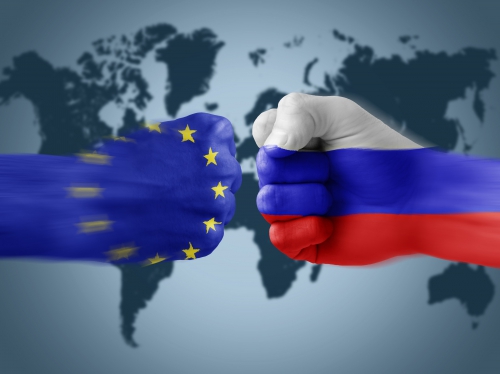



 Un factor principal en las guerras y revueltas que han sido promovidas por los EEUU es el deseo de expandir las exportaciones y los mercados financieros. Mientras que se nos dice rutinariamente que “el nacionalismo”, equiparado con “la xenofobia”, es la principal causa de la guerra, del genocidio y de otros males, las guerras y revueltas que han plagado el mundo durante el siglo pasado se han llevado a cabo en nombre de la “democracia” y el “orden mundial”. Estos eran – y son – los objetivos declarados de las dos guerras mundiales, la “Guerra Fría” y la actual “guerra contra el terrorismo”. En todas partes esto ha avanzado y ha continuado mediante la apertura de las naciones a la privatización y a la globalización. Tanto los “Catorce Puntos” de Woodrow Wilson para la reconstrucción internacional después de la Primera Guerra Mundial, como “La Carta del Atlántico” de Roosevelt que establece los objetivos de guerra de los aliados, confirmaron al “libre comercio” como un importante objetivo de guerra. El punto 3 del manifiesto wilsoniano exigía:
Un factor principal en las guerras y revueltas que han sido promovidas por los EEUU es el deseo de expandir las exportaciones y los mercados financieros. Mientras que se nos dice rutinariamente que “el nacionalismo”, equiparado con “la xenofobia”, es la principal causa de la guerra, del genocidio y de otros males, las guerras y revueltas que han plagado el mundo durante el siglo pasado se han llevado a cabo en nombre de la “democracia” y el “orden mundial”. Estos eran – y son – los objetivos declarados de las dos guerras mundiales, la “Guerra Fría” y la actual “guerra contra el terrorismo”. En todas partes esto ha avanzado y ha continuado mediante la apertura de las naciones a la privatización y a la globalización. Tanto los “Catorce Puntos” de Woodrow Wilson para la reconstrucción internacional después de la Primera Guerra Mundial, como “La Carta del Atlántico” de Roosevelt que establece los objetivos de guerra de los aliados, confirmaron al “libre comercio” como un importante objetivo de guerra. El punto 3 del manifiesto wilsoniano exigía:


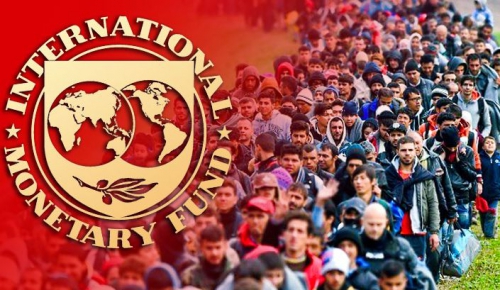
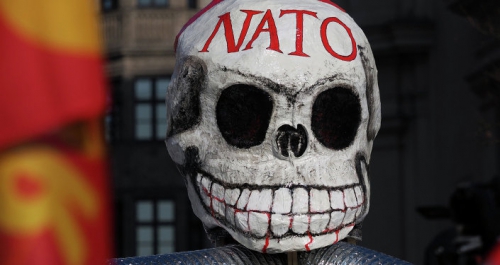

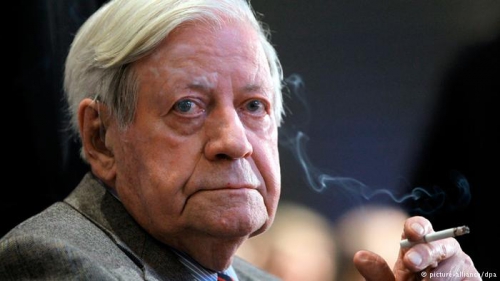


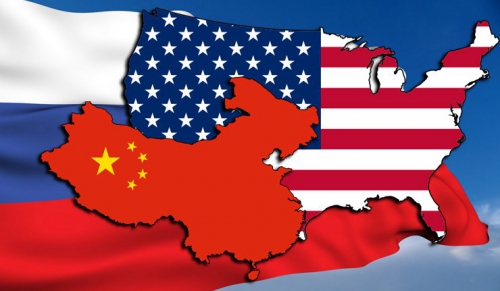


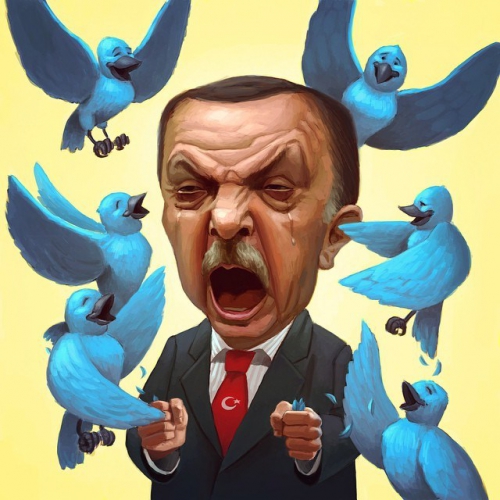
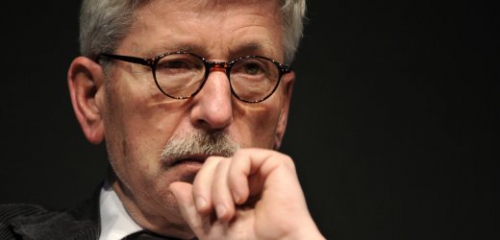
 Alle diese Menschen fanden Unterkunft, sie werden ernährt, gekleidet und medizinisch versorgt. Deutsche Bischöfe und auch Bundespräsident Gauck lobten das ehrenamtliche Engagement vieler Deutscher, und überall ist der Stolz spürbar, sich selbst und der Welt gezeigt zu haben, dass es das bessere Deutschland wirklich gibt.
Alle diese Menschen fanden Unterkunft, sie werden ernährt, gekleidet und medizinisch versorgt. Deutsche Bischöfe und auch Bundespräsident Gauck lobten das ehrenamtliche Engagement vieler Deutscher, und überall ist der Stolz spürbar, sich selbst und der Welt gezeigt zu haben, dass es das bessere Deutschland wirklich gibt.
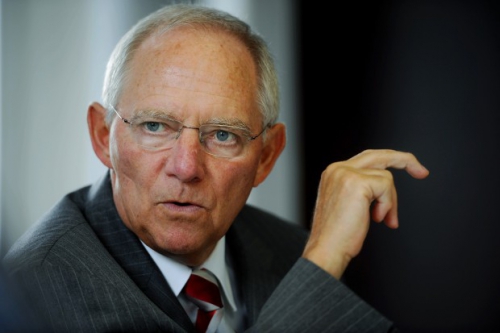

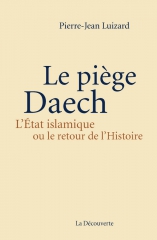 Achevé le 28 décembre 2014 et paru en février 2015, il ne concerne donc pas des événements de l'année 2015. Ne cherchez pas ici une quelconque analyse des évolutions géopolitiques de l'année écoulée, ni des événements qui ont secoué notre pays. En revanche il permet de se faire une idée beaucoup plus claire de l'histoire et de la situation de la région, l'auteur s'attaquant d'abord à expliquer la formation de l'Etat islamique, avant de faire un retour en arrière vers le découpage de la région par les puissances coloniales britanniques et françaises. Il analyse aussi la faillite des états irakiens et syriens, apporte des réflexions sur un bouleversement total et durable du Moyen-Orient et tente de justifier le titre de son ouvrage dans la dernière partie éponyme. Le moins que l'on puisse dire c'est que cet ouvrage est une réussite. Je suis toujours précautionneux face aux différentes publications en lien avec l'actualité, où certains universitaires veulent surtout se faire mousser. Point de tout cela chez Pierre-Jean Luizard qui ne fait un livre à charge contre personne, pas même l'Etat islamique, et cherche à nous livrer des clefs pour comprendre ce phénomène. Je n'ai tiqué qu'à deux reprises, la première par l'emploi systématique de l'expression « régime de Bachar al-Assad », qui certes correspond sûrement à la réalité d'un Etat qui a perdu le contrôle sur une bonne partie de son territoire, mais ne traduit pas que jusqu'à preuve du contraire, il s'agit du régime légitime reconnu par la communauté internationale. La seconde lorsque l'auteur nous livre une phrase élogieuse au sujet de l'Armée Syrienne Libre qui serait « pétrie de nationalisme arabe » alors qu'il me semble pourtant que des éléments salafistes y ont joué un rôle dès l'origine, comme ce fut le cas dans de nombreux mouvements de protestations issus du « printemps arabe » de 2011. A cette occasion l'auteur n'étaye d'ailleurs pas son propos par des déclarations ou toute autre forme de démonstration, nous devrions donc le croire sur parole, et en toute bonne foi.
Achevé le 28 décembre 2014 et paru en février 2015, il ne concerne donc pas des événements de l'année 2015. Ne cherchez pas ici une quelconque analyse des évolutions géopolitiques de l'année écoulée, ni des événements qui ont secoué notre pays. En revanche il permet de se faire une idée beaucoup plus claire de l'histoire et de la situation de la région, l'auteur s'attaquant d'abord à expliquer la formation de l'Etat islamique, avant de faire un retour en arrière vers le découpage de la région par les puissances coloniales britanniques et françaises. Il analyse aussi la faillite des états irakiens et syriens, apporte des réflexions sur un bouleversement total et durable du Moyen-Orient et tente de justifier le titre de son ouvrage dans la dernière partie éponyme. Le moins que l'on puisse dire c'est que cet ouvrage est une réussite. Je suis toujours précautionneux face aux différentes publications en lien avec l'actualité, où certains universitaires veulent surtout se faire mousser. Point de tout cela chez Pierre-Jean Luizard qui ne fait un livre à charge contre personne, pas même l'Etat islamique, et cherche à nous livrer des clefs pour comprendre ce phénomène. Je n'ai tiqué qu'à deux reprises, la première par l'emploi systématique de l'expression « régime de Bachar al-Assad », qui certes correspond sûrement à la réalité d'un Etat qui a perdu le contrôle sur une bonne partie de son territoire, mais ne traduit pas que jusqu'à preuve du contraire, il s'agit du régime légitime reconnu par la communauté internationale. La seconde lorsque l'auteur nous livre une phrase élogieuse au sujet de l'Armée Syrienne Libre qui serait « pétrie de nationalisme arabe » alors qu'il me semble pourtant que des éléments salafistes y ont joué un rôle dès l'origine, comme ce fut le cas dans de nombreux mouvements de protestations issus du « printemps arabe » de 2011. A cette occasion l'auteur n'étaye d'ailleurs pas son propos par des déclarations ou toute autre forme de démonstration, nous devrions donc le croire sur parole, et en toute bonne foi.